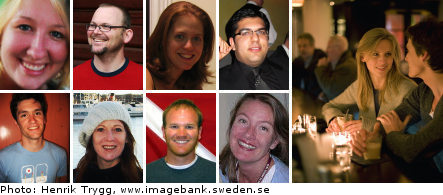I always hear it is, so I suppose it is true. But at the same time, I don’t really believe it.
I think it all comes down to Swedes’ issues with expectations. In general, Swedes are shy and we often feel uncomfortable with what we don’t recognize. Not because we think others are strange, but because we want to be sure of what is being expected of us.
We are terrified of doing something wrong and making things get awkward and embarrassing. I often hear people say that you can talk for a whole evening with a Swede, thinking you have finally made a Swedish friend, but the next day the Swede behaves as if you have never met.
But that is because we Swedes get a little uncertain. We don’t know if something is expected from us now that we can’t live up to. And perhaps we also want to be polite (!) and show that we do not expect anything from you.
To a Swede, that is being polite. Because Swedes don’t want to seem demanding, the solution, I think, is simply to break the ice and start talking to your Swede again. They will appreciate it. We are, deep down, still a homogeneous people that struggles to understand (though we really want to!) people who are not exactly the same as us.
We are also products of a welfare state, where we rely on society and not other people to meet our needs. Being independent and not expecting or demanding anything from other people is very Swedish.
Yes and no. First, one would have to define “friend.” Swedes are famous for being a bit introverted, but out here in the country, give a local an alcohol-based social lubricant and introduce them to a person in the vicinity speaking English, and that English-speaker has a friend for life (or at least until closing time, whichever comes first).
I am sure that they are much more sophisticated in the big city and this does not happen as often. But in regards to real friends, I think that Swedes are no different than anyone else.
My best friends here in Sweden have carried me on their shoulders through thick and thin, and I am extremely grateful for their friendship, honesty, and understanding, even at times when things get lost in translation. Friendship is a two-way street and no social or language barrier changes that simple truth.
But if you want your friendship to last, remember the rule of thumb that “maybe” means “no”, and you will be just fine. And anyone who has lived here for any amount of time will know exactly what that means.
That depends on how bold and willing you are. Swedes tend to be a bit afraid of making the first move, perhaps because that would make them look different – not the done thing around here where everyone is supposed to be like everyone else.
I, on the other hand, am not at all afraid of being forward and looking a bit foolish, so I am used to making the first move (and the second and the third…).
Usually people respond very warmly, as if just waiting for an excuse to open up. I see that even with my in-laws: they shake hands with each other and with my husband but all of them hug and kiss me (of course, I started it).
As for real friendship, I am still working on it. Now that I can hold a conversation in Swedish, things are looking brighter. Swedes love to speak English and most are very fluent, but the “real life” language is Swedish, of course.
In this sense, I don’t think they are any different to other nationalities. In social settings, if you can communicate in the native language, it’s easier to get close to people all over the world.
Generally I have found Swedes very closed and conservative. Unlike people from some other countries, Swedes take a long time before you can call them your friend.
Swedish people are generally reluctant to talk to strangers unless they have consumed a lot of alcohol, when they finally open up.
From my experience I can say one thing for sure: Swedes may take some time to get to know, and may come across as being a bit arrogant in the beginning, but when he/she becomes a friend, then you get to know how uncomplicated, caring and honest they are.
In short, it is best to take the initiative, as otherwise it can be difficult to get over the first step.
Most of the Swedes I have met have been amicable, but they always seem a little uncomfortable because they don’t really know what to say to me.
To be fair, I think it’s always hard to make friends with people who don’t comfortably speak the same language you do, and it just makes me want to learn Swedish that much faster. Even though Swedes understand English and can speak it, many of the people I’ve met that are my age (who haven’t studied abroad or dated English-speakers) have been shy to speak it.
I also think Swedes are generally more reserved and candid than what I’m used to. But, as soon as formalities were aside and I was accepted into a group, the Swedes have treated me as warmly and graciously as anyone could wish their friends to be.
Yes. Incredibly. Swedes are notorious for being shy. And while this obviously differs from person to person and city to city, I have found it difficult to make friends with Swedes.
Other immigrants are much easier to connect with, maybe because of shared experiences in the move to Sweden, shared values that led to a move to Sweden, or just the fact that they don’t have any Swedish friends either and are looking for friendship.
Coming from the US, I am used to a bit more openness. A bit more willingness to get to know someone. Swedes often complain that Americans are overly friendly. They see this as a negative, something that leads to superficial relationships.
I just don’t agree. I see this friendliness as a sort of shotgun approach. Take a shot and you’re bound to hit something.
Obviously, a lot of those people will end up just being simple acquaintances, but out of all those people you are friendly with, you could find your new drinking buddy. Or your best friend. Or the girl of your dreams.
In the end persistence pays off. Just keep smiling at people. Talking to people. Introducing yourself. So while making friends with Swedes is hard, eventually you will have found a great group of Swedes to spend your time with.











 Please whitelist us to continue reading.
Please whitelist us to continue reading.